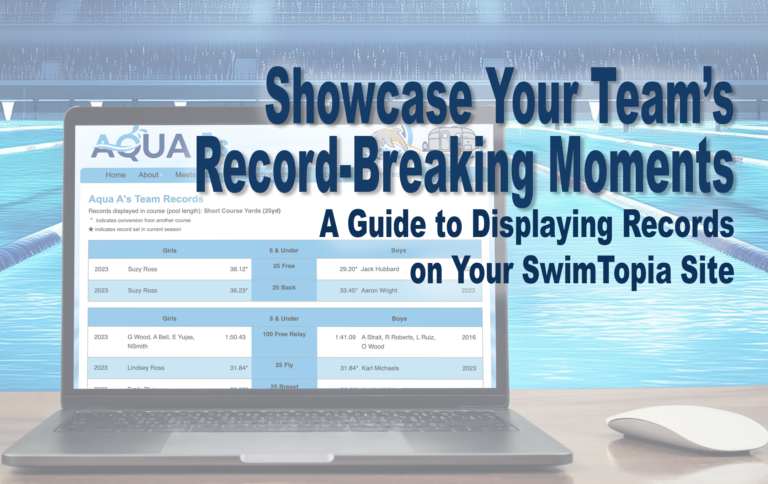Though still brutally hot (depending on where you are in the country), peak summer swim season is finally passing. This might also mean assessing what’s next for your young swimmer. In our previous blog, SwimTopia spoke about the immense benefits of year-round competitive (a.k.a. club) swim teams. Not only will your athlete continue developing strong friendships in club swim, they will also increase swim conditioning, hone stroke technique, and learn about higher levels of swim competition.
There’s so much to love about being on a year-round swim team. However, there is also a lot of information to digest, especially as it relates to training regimens, practice schedules, equipment, and meets. Much like summer swim, familiarity will come, but the first step is simply choosing the right team for your swimmer. The following are SwimTopia’s club team criteria!
- Coach to Swimmer Ratio
-
- Though dependent on your swimmer’s age and expertise, a higher coach-to-swimmer ratio is ideal.
- When it comes to entry-level/developmental swimming, look for not only a primary coach but also assistant coaches (especially if the developmental group(s) is/are large). This means more eyes on the swimmers and more personalized instruction.
- Length and Focus of Practices
-
- Young swimmers absolutely need time in the pool. Youngsters must swim in order to get better at swimming, after all. However, at the developmental level, the primary focus should be on sharpening strokes and having FUN (not grinding yards).
- Practices should be mostly technique-based for developmental swimmers. Technique remains important throughout an athlete’s swim career, but age group to senior level (13 & up) training should have a higher emphasis on endurance and speed.
- Coach Credentials
-
- Good questions to ask are: How long have the coaches been coaching? What are their certifications? What is their athletic background? How do they describe their training philosophy? Are they certified by USA Swimming? (to complete USA Swimming’s coach certification process, coaches must do several training courses, be First Aid/CPR certified, have a background check, and meet other criteria)
- Move-up and Group Criteria (including meet and practice attendance requirements)
- Often, club teams require standards to enter a particular training group or that a percentage of practices be attended per month/week. This keeps ability levels similar across each group and is useful to know when deciding which group is best for your athlete/what your athletes’ trajectory will be during their time on the team.
- Group move-up criteria should be clear such that your swimmer knows exactly what they must achieve before progressing to the next level.
- Distribution of Ages Across the Team (top heavy age-wise, or bottom heavy?)
- Though not always the case (i.e.especially when it comes to newer teams), the age distribution across a team can indicate a couple things. A smaller developmental program with a large age group/senior program could signify that many swimmers transfer to the club from other teams. This could also mean that the team excels in age-group/senior level training, but is not as strong at fundamentals.
- A smaller age group/senior program with a larger developmental program suggests swimmers are transferring out at the higher level, but that there is a strong developmental emphasis.
- Keep in mind that these are not hard and fast rules, as each team’s circumstances are different! These are simply items to consider during your selection process.
- Convenience
-
- Good questions to ask are: How close is the pool to your child’s school or your house? What are the practice times and how do these times fit with your family’s schedule for school, homework, and other extracurricular activities? Do you have several swimmers in your family? If so, how do all of their practice times sync up with each other? Do you have friends on the team that you can carpool with?
- Friends on the Team
-
- Switching from summer swim to year-round swimming is a big shift in commitment. One of the most important things for new club swimmers to assess is whether they’re having fun and training with their friends. Sure, they’ll make new friends once they join. This said, having friends who are already on the team (and love being there!) makes it easier for your own swimmer to love this new experience.
- General Sentiment in the Swim Community
-
- Ask other parents in the swim community about the club’s reputation!. Both good and bad news travels quickly by word of mouth.
Altogether, finding the right club team is a very personal process. Not every athlete wants the same thing. Some swimmers might desire a super competitive/rigorous program and others might just want stronger fitness. No one’s goals are any more legitimate than anyone else’s. Do not be afraid to ask questions and shop around! Often teams allow prospective swimmers to try a practice or two before joining; this allows you to analyze whether the training/general atmosphere is an appropriate fit.
Happy hunting!



